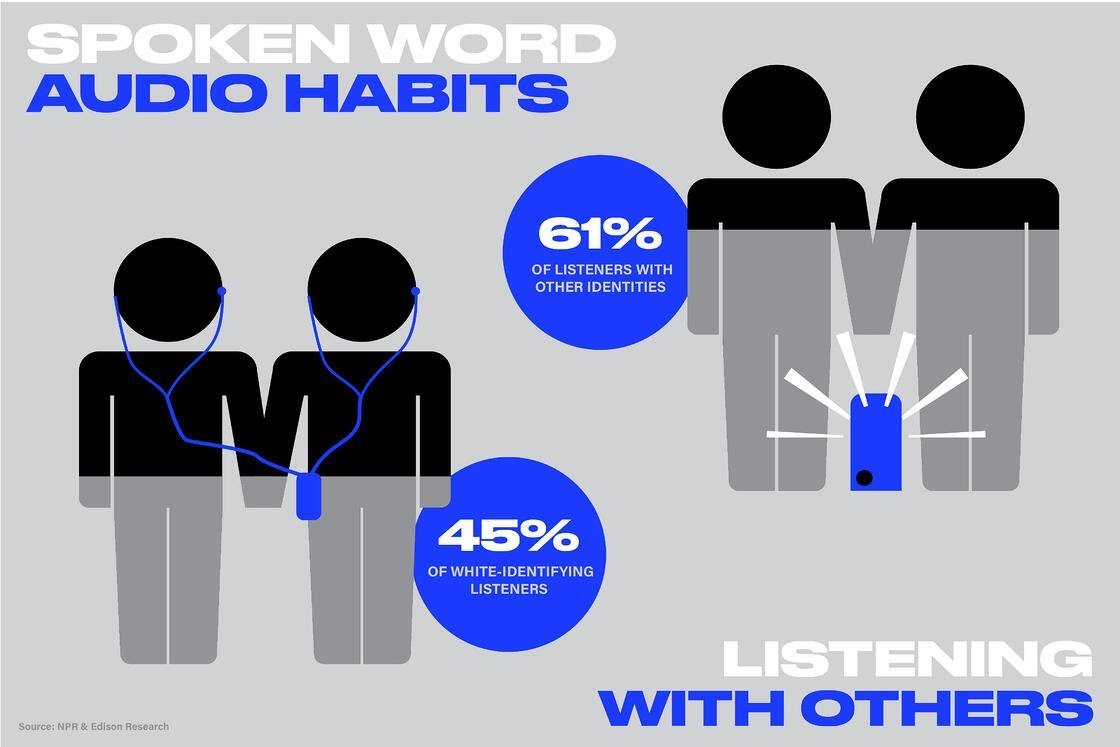Could podcasts be the key to media equality?
With over 2 million shows created to date, the podcast is reshaping media as we know it.
Given the accessibility, authenticity and depth this format offers, it’s not totally surprising that it appeals to a wide array of listeners.
What might come as a surprise, though, is that podcasts and other forms of spoken audio show particular potential and significance among racially and culturally diverse groups.
We explore some of the latest data on this topic — and discuss why it matters — below.
Why does this trend matter?
The significance of this trend can be broken down as follows.
The overwhelming majority of popular media has been created by and for white, cisgender, able-bodied, and heterosexual folks.
To make matters worse, it generates profit through appropriation — stealing from the communities it so often overlooks.
Surely, we can all agree this is totally unacceptable.
So, when we see an entire branch of media — in this case, spoken audio — increasing in popularity and perceived value among marginalized communities, we see an opportunity for social progress and growth.
Now that we’ve got this sorted, let’s take a look at the latest data, shall we?
What is spoken word audio?
The data in this post comes from NPR and Edison Research’s new release, The 2021 Spoken Word Audio Report.
For these purposes, “spoken word audio” (not to be confused with the performance art known as spoken word) is popular audio content other than music.
Here, this means anything in these categories:
News
Sports
Talk/Personalities
And audiobooks
Included in this umbrella is the (accessible, adaptable, exceptional) podcast — a medium we know and love.
Media made for its listeners?
Last week, we shared that many spoken word audio consumers tune in because they feel like this kind of content is made for people like them.
What’s even more interesting, however, is that this sentiment seems to be more common among racially and culturally diverse listeners.
Among respondents that don’t identify exclusively as white, 66% gave this reason for consuming spoken word audio — compared against only 54% of white-identifying listeners.
Consumption increase
Also important to note, increased consumption seems to be more common among racially and culturally diverse folks.
Comparing their habits now to five years prior, 59% of diverse listeners reported a listening increase, while just 48% of white-identifying listeners reported the same.
More reasons to listen
Respondents were also asked to supply their reasons for listening.
Interestingly, listeners identifying exclusively as white offered an average of 9 reasons for tuning in to spoken word audio, while more diverse folks provided an average of 12.
This could perhaps indicate greater or more meaningful investment in this kind of content. It could also suggest that, for diverse audiences, spoken word audio offers greater reward.
The act of sharing
Spoken audio listening was also more likely to be a shared experience among respondents that identify as something other than “white.”
In fact, 61% of diverse respondents reported listening to this content with someone, compared against just 45% of white-identifying folks.
Perceived value
When asked if spoken word audio was becoming a more important part of their lives, there was again a significant difference in response from the two groups.
While 55% of diverse listeners said that spoken audio had become more important, this statement was only true for 40% of listeners who identified as white.
Shared experience and culture
Aside from these stats, there’s a case to be made that spoken audio is an ideal way to engage with experiences and perspectives other than your own, and to learn about other cultures.
One survey respondent, Rick, shared his thoughts on this.
“I really like to be open-minded,” he told Edison and NPR. “Me being Mexican American, living in California ... I want to know about different parts of the world, country, different things like that. It provides a perspective that I wouldn't have found anywhere else.”
The unique value of the podcast
The podcast shows potential to share perspectives, build understanding, provide representation, and even democratize content creation like few other types of modern media.
This is in part because the podcast is:
More exploratory and in-depth
Less driven by capitalism
More focused on development and education
Less dictated by aesthetic and wealth
And more accessible to both creators and audiences
Written by Roger Nairn, JarAudio.com








